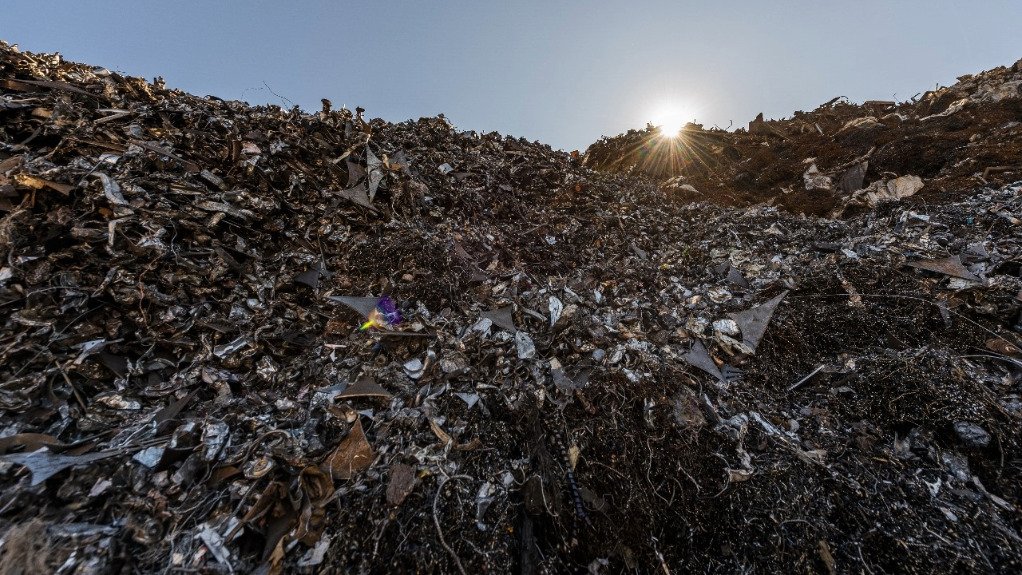If export taxes, PPS are relaxed, domestic scrap metal resources will fail to meet demand, Coega Steels director says
South Africa’s ferrous scrap metal resources may fail to meet domestic demand should either the export tax thereon or provisions of the Price Preference System (PPS) be relaxed, electric steel-producing mini-mill Coega Steels director Amit Saini says.
This finite resource is primarily used in the manufacturing of green steel, which has increasingly been replacing traditional steelmaking methods globally.
Saini explains that carbon emissions are about four times higher when steel is produced from iron-ore and coal compared with melting scrap.
To stimulate the local green steel industry and to align with the global trend, government introduced the PPS in September 2013 and an export tax in August 2021 on scrap metal.
These measures have led to questions being asked about the long-term viability of the country’s solitary primary-steel producer, which, in turn, have led to pressure being put on the authorities to revisit their policies.
Saini says that, meanwhile, the secondary steel industry has raised concerns that the availability of scrap will come under pressure should the tax and/or PPS be removed or reset.
“It will effectively mean that South Africa will instead export its scrap metal to South Asian countries, resulting in more competition to buy scrap and therefore increasing the production costs of the greener mini-mills,” he says.
Saini says the country cannot afford to “toy” with the existing policies that are already “only just” managing to preserve scrap stocks.
He warns that backpedalling on these would be “devastating and create an existential crisis” for mini-mills, which rely on the repurposing of scrap in the manufacturing of their product.
“Deindustrialisation is a real possibility if the export tax is done away with and the PPS overhauled.
“Increased production costs are all but guaranteed because of greater competition for scrap, making us less competitive in Africa and other foreign markets,” Saini says.
With more mini-mills – one each in Nigel and Durban – due to come online soon and existing producers continuing to expand their capacity, Saini says the availability of scrap would be even further compromised.
In addition, Meyerton-based SA Steel Mills, a mini-mill currently under business rescue and up for sale, will consume an estimated 300 000 t/y of scrap as soon as production stabilises under the new owners.
Saini says the scrap that would be needed by SA Steel Mills did not align with the availability of stock in Gauteng.
“It’s just not there,” he says.
As it stands, he explains, the installed production capacity in the secondary steel manufacturing sector is estimated at 2.5-million to 2.8-million tonnes a year, meaning 2.7-million to 3-million tonnes of ferrous scrap is needed.
Adding the capacity of the two new green steel producers and planned expansions to the existing ones, this number is estimated to grow to four-million tonnes in 2026.
Saini warns that tinkering with the current regulations, which would more than likely trigger a reduction in production, would put thousands of jobs at risk.
South Africa’s 13 mini-mills, which are far and away the top consumers of domestic scrap, currently employ more than 5 000 workers.
The PPS requires scrap metal dealers to sell their wares to local clients at 30% less than international prices, although there are consumers paying more than the regulated rate.
Many nations have and are implementing measures to restrict scrap exports in an effort to retain this critical resource, Saini points out.
Owing to the shift towards decarbonised production and greener steel, the global demand is projected to rise by almost 50% by 2050, according to the Organisation for Economic Cooperation and Development.
Saini, who recently said he believed South Africa could become Africa’s green steel hub, also pointed out that mini mills were positioned closer to demand hubs, effectively neutralising the problem of high transportation costs.
“Yet, all this potential will be lost if tax and PPS policies are changed,” he says.
Saini posits that prioritising the preservation of scrap and ensuring sustainability of green-steel production locally is an imperative.
He says it would be “unthinkable” for South Africa to allow the exportation of these resources for the benefit of other countries.
“We cannot head in the opposite direction by liberalising the PPS discount. Instead, we should look at imposing an outright ban on the export of ferrous scrap,” he says.
This would align with what the rest of the world is doing, he adds.
Consulting company GMK Centre, which is focused on the EU’s iron and steel markets, has predicted that worldwide seaborne trade volumes will decrease as local beneficiation increases, leading to a rise in prices.
GMK’s latest Global Scrap Exports Restrictions report reiterates that “scrap prices will be regulated through trade restrictions” in local markets.
In the EU, for example, enforcement of changes to the Waste Shipment Regulation in May 2027 will lead to a ban of ferrous scrap exports by 27 countries.
Article Enquiry
Email Article
Save Article
Feedback
To advertise email advertising@creamermedia.co.za or click here
Press Office
Announcements
What's On
Subscribe to improve your user experience...
Option 1 (equivalent of R125 a month):
Receive a weekly copy of Creamer Media's Engineering News & Mining Weekly magazine
(print copy for those in South Africa and e-magazine for those outside of South Africa)
Receive daily email newsletters
Access to full search results
Access archive of magazine back copies
Access to Projects in Progress
Access to ONE Research Report of your choice in PDF format
Option 2 (equivalent of R375 a month):
All benefits from Option 1
PLUS
Access to Creamer Media's Research Channel Africa for ALL Research Reports, in PDF format, on various industrial and mining sectors
including Electricity; Water; Energy Transition; Hydrogen; Roads, Rail and Ports; Coal; Gold; Platinum; Battery Metals; etc.
Already a subscriber?
Forgotten your password?
Receive weekly copy of Creamer Media's Engineering News & Mining Weekly magazine (print copy for those in South Africa and e-magazine for those outside of South Africa)
➕
Recieve daily email newsletters
➕
Access to full search results
➕
Access archive of magazine back copies
➕
Access to Projects in Progress
➕
Access to ONE Research Report of your choice in PDF format
RESEARCH CHANNEL AFRICA
R4500 (equivalent of R375 a month)
SUBSCRIBEAll benefits from Option 1
➕
Access to Creamer Media's Research Channel Africa for ALL Research Reports on various industrial and mining sectors, in PDF format, including on:
Electricity
➕
Water
➕
Energy Transition
➕
Hydrogen
➕
Roads, Rail and Ports
➕
Coal
➕
Gold
➕
Platinum
➕
Battery Metals
➕
etc.
Receive all benefits from Option 1 or Option 2 delivered to numerous people at your company
➕
Multiple User names and Passwords for simultaneous log-ins
➕
Intranet integration access to all in your organisation



















